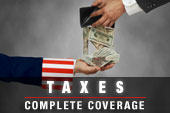Catherine Monson’s Texas-based graphics and visual communications company has 47 franchisees across the country. Each pays state income taxes where they operate. So it came as a surprise to Monson when seven states – none of which had a local franchisee sent stiff corporate income tax bills to her headquarters for the operation of the franchisees.

Although her business, Fastsigns International, has no employees, offices or other physical presence in any of those states, revenue-starved state tax officials used ambiguities in state laws to tax Monson’s business. She ended up paying more than $115,000 to Arizona, California, Missouri, Oregon, Pennsylvania, South Carolina and Wisconsin.
Now she is fending off efforts by other states that have come hunting for revenue. “More and more states are coming at us,” Monson told The Fiscal Times this week. “With this, there is no certainty. Every business needs certainty.” Monson is one of many small business owners who say states are aggressively imposing taxes regardless of whether the business has a physical presence in the state.
The effort by cash-strapped states to raise revenue from out-of-state companies has sparked a bi-partisan backlash in Washington where Virginia Reps. Bob Goodlatte, R, and Bobby Scott, D, sponsored legislation limiting states’ ability to impose corporate income taxes on companies without a meaningful physical presence in that state. The so-called “standard of nexus” would be uniform for all states.
While the Business Activity Tax Simplification Act (BATSA) cleared the House Judiciary Committee last summer, it never received a vote in the full House. Its authors hope it will be considered along with other tax measures immediately after the November election or next year when Congress considers tax reform.
“The states are exploiting this situation,” said Jack O’Rourke, an attorney for a coalition of more than 100 companies that are pressing for congressional action to prevent these aggressive state tax forays.
State tax officials say the proposed legislation would allow businesses to continue to take advantage of states and in some cases avoid all tax liability by shifting their income to states with low or no income or other business taxes. “The new Federal framework would allow large, multi-state businesses to engage in tax structuring and planning that would enable them to avoid a significant part, if not all, of their state tax liabilities,” Utah state tax commissioner Bruce Johnson, speaking on behalf of the Federation of Tax Administrators, told the House Judiciary Committee last summer. Johnson said when out-of-state businesses don’t pay their share, small, local businesses bear the burden.
But that makes no sense to businesses that have been hit with state income taxes simply for driving through a state. LTL Service of Wisconsin, Inc., a small trucking company in South Milwaukee operated by Nancy Narr and her family, experienced that four years ago. In 2008, Narr’s business received a questionnaire from the state of Nebraska, asking whether it did business, had inventory, customers, property or income in the state.
While the firm answered no to all those questions, it acknowledged that its trucks had traveled through the state. That was enough for Nebraska to assess the company back taxes of $1,321, which Narr received three years later, with penalties for delinquent payments tacked on for 2008, 2009 and 2010.
Since the state waited three years to notify Narr of her delinquent taxes, Nebraska eventually waived the penalties and interest. But Narr says the $979 payment is still “infuriating.”
State tax collectors, especially in high tax states already dunning out-of-state businesses who sell into their states, believe companies like Fastsigns and LTL Services are fair game. According to the Federation of Tax Administrators, eight states estimate they would see major losses in revenue if they could no longer rely on corporate income taxes coming from out-of-state businesses. California and New Jersey each estimated they would lose more than $600 million in revenue by 2013 if the BATSA passed.
Tough economic times have motivated state tax officials to go after out-of-state businesses that have, at most, a tangential relationship to the state. The budget gaps that states have had to close for the fiscal year that began July 1 total $55 billion in 31 states, according to the Center on Budget and Policy Priorities. The amount is smaller than in past years, but still very large by historical standards.
Court rulings and legislation generally have held that a company can be taxed on its income in a state if it has employees, plants or offices there. But what is far less clear is whether state tax departments have the authority to tax out-of-state companies for any business activity they conduct in the state – whether it is awarding a franchise, attending a trade show or simply driving through the state.
Absent any definitive ruling by the Supreme Court or legislative action by Congress, many states have recently pushed the envelope on the traditional nexus standard by advocating something they call “economic nexus.” That new standard says that if a company has a customer in its jurisdiction – even if the company is not physically present– that company is subject to that state’s corporate income tax.
The debate over whether states can impose taxes across state lines doesn’t stop at corporate income taxes. Taxes on Internet sales have also been under the spotlight. But unlike the corporate income tax, states attempting to collect sales taxes are hampered by a Supreme Court decision, Quill Corp. v. North Dakota, which said a company must have a physical presence in a state before it can impose sales taxes. There has not been a court decision setting a nexus for corporate income tax.
Maggi Lazarus, an attorney for the Coalition for Interstate Tax Fairness and Job Growth, said the BATSA legislation is essential because the current anything-goes state tax policy has “created an enormous amount of uncertainty for businesses.”
And since most companies are small businesses that can’t afford to participate in expensive legal battles, they just agree to pay up. “I can’t afford to fight these things. So what do you do? You pay it.” Narr of LTL Services said. “They’re charging me to drive up and down their highways. It’s highway robbery. There’s no better way to put it.”






